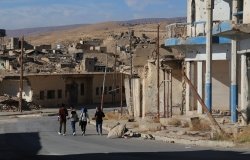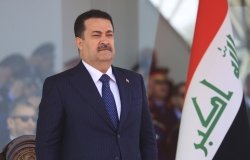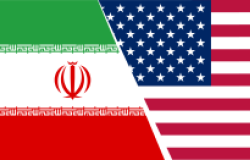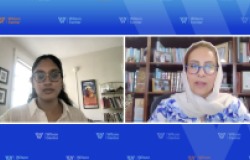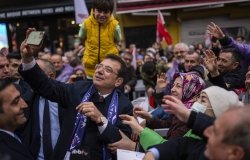Globalization, Gender, and Religion: Islam and Catholicism Compared
Overview
Summary of a meeting cosponsored by the Middle East Project and the Kennan Institute with Nayereh Tohidi, California State University (Northridge) and current research scholar at the Kennan Institute.
At the Woodrow Wilson Center on Friday, February 15, 2002, the Middle East Project and Kennan Institute cosponsored a book launch for Nayereh Tohidi's newest publication Globalization, Gender, and Religion: The Politics of Women's Rights in Catholic and Muslim Societies.
Tohidi said "The impetus for the book came from the United Nations (UN) Fourth World Conference on Women held in Beijing in 1995 and then the Beijing Plus Five conference in New York in 2000." Attendees (over 30,000) were government representatives of almost all UN-member states (except for a few such as Saudi Arabia and Afghanistan), academia, and non-governmental organizations (NGOs). The main goals of these world conferences on women have been equality, development, and peace. A significant outcome of the numerous regional and international preparatory UN-sponsored conferences on women since 1975 was the Beijing Platform for Action (PFA). Tohidi commented that, as an internationally accepted blueprint for achieving women's rights, the Beijing PFA has been considered a major human/women's rights accomplishment. It identifies twelve points, including: equal rights, preventing armed conflict, eradicating poverty, and promoting women's education, health, and empowerment. It also calls for laws and measures against violence against women, banning and eradicating practices such as female genital cutting and 'honor killing.'
Tohidi said that the gender dimension of a new and important global trend became more manifest during these world conferences reflecting certain international divisions of political, cultural (especially religious), and economic nature connected to expanding modernization, globalization, and religio-nationalist or ethno-religious identity politics. This trend was displayed through a major split among the delegates around issues of sexuality, reproductive rights, including abortion rights, equity versus equality, sex versus gender, and universality versus particularity of women's rights as human rights. That a coalition of conservative Catholics and Muslims led by the Vatican (the Holy See) were united as a block in lobbying for a unified position on these issues was the news of the conference.
Tohidi posed some of the questions that her book addresses: "In the inevitable conflict that arise between the old and the new in the processes of industrialization, modernization, globalization and democratization, why is it that women and their status, especially their sexuality, become such a focus of attention? Why is it that politics in Catholic and Muslim contexts are so often played out on women's bodies? Why do conservatives and religious fundamentalists obsess in keeping women subordinate? What, exactly, is it that fundamentalists are really worried about? How do women respond to and strategize against such conservative pressures and why do some women join such fundamentalist movements?"
The first two chapters of the book analyze and theorize the historical, sociological, and political roots of these issues from a comparative perspective. In the eight remaining chapters, scholars from eight different Catholic and Muslim communities analyze some of these issues within each particular country or region (the U.S., Ireland, Spain, Latin America, Turkey, Iran, Bangladesh, and Egypt) with an emphasis on a variety of strategies that women adopt for implementation of the PFA.
From this collaborative research, it has been determined that reassertion of patriarchal gender relations presumably authorized by religion has been central to the conservative nationalist religious movements that have emerged since the early 1970s, in part in opposition to the current wave of modernization and globalization and to the corrupt non-democratic and often Western-oriented regimes. In objection to the Clinton administration's policy in support of "planned parenthood abroad" and the United Nations Fund for Population Activities, and NGOs like International Planned Parenthood initiatives during the 1993 World Conference on Population and Development in Cairo, Pope John Paul II too began to use "anti-Western, anti-imperialistic" rhetoric to campaign against "imperialistic threats designed to impose population control measures and Western morality on poor countries in exchange for foreign aid."
Conservative Muslim states, upset with "Westoxification" of women, stood behind the Pope's stance. Tohidi emphasized that the problem is not specifically tied to religion, although followers of any religion use their faith as an anchor to stabilize patriarchal traditions in these changing times. The coalition against equal rights include states from different civilizations (Africa, Asia, and America) and of different religions, Christian as well as Muslim. This cultural, religious, and civilizational heterogeneity challenges the controversial thesis of the "clash of civilization" formulated by Samuel Huntington. A real clash, Tohidi, argued, cuts across global East and West, North and South and takes place between those forces supporting democracy, pluralism, and universal human rights, and those supporting a political order based on religious authoritarianism.
Tohidi closed by saying "in the Islamic World, there is an entanglement" of anti-imperialist, pro-Islam, and ambivalence and anxiety toward a Western-associated modernization and globalization. As a result, women's negotiation with modernity, and feminist aspiration for equal rights are caught in a web of contradictions.
Hosted By

Middle East Program
The Wilson Center’s Middle East Program serves as a crucial resource for the policymaking community and beyond, providing analyses and research that helps inform US foreign policymaking, stimulates public debate, and expands knowledge about issues in the wider Middle East and North Africa (MENA) region. Read more
Thank you for your interest in this event. Please send any feedback or questions to our Events staff.






